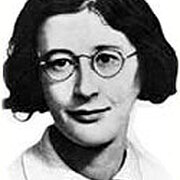Simone Weil (1909–1943)
Teoksen Waiting for God tekijä
Tietoja tekijästä
Born in Paris, Weil came from a highly intellectual family. After a brilliant academic career at school and university, she taught philosophy interspersed with periods of hard manual labor on farms and in factories. Throughout her life she combined sophisticated and scholarly interests with an näytä lisää extreme moral intensity and identification with the poor and oppressed. A twentieth-century Pascal (see Vol. 4), this ardently spiritual woman was a social thinker, sensitive to the crises of modern humanity. Jewish by birth, Christian by vocation, and Greek by aesthetic choice, Weil has influenced religious thinking profoundly in the years since her death. "Humility is the root of love," she said as she questioned traditional theologians and held that the apostles had badly interpreted Christ's teaching. Christianity was, she thought, to blame for the heresy of progress. During World War II, Weil starved herself to death, refusing to eat while victims of the war still suffered. (Bowker Author Biography) näytä vähemmän
Erotteluhuomautus:
(eng) Do not combine with Simone Veil (born 1927), French lawyer and politician.
Image credit: Ashford Borough Council
Tekijän teokset
Love in the Void: Where God Finds Us (Plough Spiritual Guides: Backpack Classics) (2018) 67 kappaletta
Two moral essays : draft for a statement of human obligations and human personality (1981) 36 kappaletta
Œuvres complètes (tome IV, volume I) : Écrits de Marseille (Philosophie, Sciences, Religion, Questions Politiques et… (2008) 7 kappaletta
Œuvres complètes (tome II, volume I) : Écrits historiques et politiques (L'engagement syndical (1927-juillet 1934)) (1988) 5 kappaletta
Verworteling: Wat we de mens verplicht zijn 4 kappaletta
Œuvres complètes (tome II, volume III) : Écrits historiques et politiques (Vers la guerre (1937-1940)) (1988) 4 kappaletta
De l'attention - Réflexions sur le bon usage des études scolaires en vue de l'amour de Dieu (2018) 3 kappaletta
Œuvres complètes (tome V, volume I): Écrits de New York et de Londres (Questions politiques et religieuses… (2019) 3 kappaletta
Œuvres complètes (tome II, volume II) : Écrits historiques et politiques (L'expérience ouvrière et l'adieu à la… (1991) 3 kappaletta
Œuvres complètes (tome VI, volume I) : Cahiers (tome VI, volume I) (1933 - Septembre 1941) (1994) 3 kappaletta
El deseo 2 kappaletta
Œuvres complètes (tome V, volume II): Écrits de New York et de Londres (L'Enracinement (1943)) (2013) 2 kappaletta
À porta do farol faz escuro 2 kappaletta
Anthologie Simone Weil: Réflexions sur les causes de la liberté et de l'oppression sociale - L'Enracinement - La… (2019) 1 kappale
Oceans of Air 1 kappale
Reflexoes Sobre as Causas da Liberdade e da Opressao Social (Em Portugues do Brasil) (2019) 1 kappale
Roma 1 kappale
Riflessioni sulle cause della liberta' e dell'oppressione sociale. Prefazione di Alberto Melloni. 1 kappale
TOW MORAL ESSAYS 1 kappale
OPRESIÓN Y LIBERTAD 1 kappale
Simon Weil: An Anthology — Tekijä — 1 kappale
Poesie e altri scritti 1 kappale
Trepet in poslusnost 1 kappale
Obbedire all'amore nella giustizia 1 kappale
Weil, Simone Archive 1 kappale
Escritos politicos 1 kappale
L'amour de Dieu et le malheur 1 kappale
Pour une littérature combattante (CEUX QUI MARCHENT CONTRE LE VENT) (French Edition) (2020) 1 kappale
Meditime mbi nënshtrimin e mbi lirinë 1 kappale
Wybór pism, tom II 1 kappale
Forme de iubire implicita a lui Dumnezeu 1 kappale
Associated Works
Merkitty avainsanalla
Yleistieto
- Kanoninen nimi
- Weil, Simone
- Virallinen nimi
- Weil, Simone Adolphine
- Muut nimet
- Emile Novis
- Syntymäaika
- 1909-02-03
- Kuolinaika
- 1943-08-24
- Hautapaikka
- Bybrook Cemetery, Ashford, Kent, England
- Sukupuoli
- female
- Kansalaisuus
- France
- Syntymäpaikka
- Paris, France
- Kuolinpaikka
- Ashford, Kent, England, UK
- Kuolinsyy
- cardiac failure
- Asuinpaikat
- New York, New York, USA
- Koulutus
- Lycée Henri IV, Paris, France
École Normale Supérieure (diplôme d'études supérieures|1931) - Ammatit
- philosopher
writer
social activist - Suhteet
- Weil, André (brother)
- Lyhyt elämäkerta
- Simone Weil was born into a wealthy Parisian Jewish family originally from the Alsace region. She suffered from ill-health but was a brilliant student, excelling in languages, philosophy, literature, and science. After graduation from the École Normale Supérieure in 1931, she taught at several rural academies, and wrote articles for socialist journals. She was a political idealist, and took a leave of absence to work in a Renault factory in order to become more closely connected with the French working class. She went to Spain in 1936 to fight for the Republic against fascism in the Civil War, but was injured in a cooking fire and also contracted tuberculosis. Weil became heavily involved in Catholicism, having a series of mystical experiences. She traveled to the United States with her family and eventually resettled in England. She died aged only 34, apparently having starved herself to death "whilst the balance of her mind was disturbed." Simone Weil’s books were all published posthumously.
- Erotteluhuomautus
- Do not combine with Simone Veil (born 1927), French lawyer and politician.
Jäseniä
Kirja-arvosteluja
Listat
Palkinnot
You May Also Like
Associated Authors
Tilastot
- Teokset
- 170
- Also by
- 7
- Jäseniä
- 6,021
- Suosituimmuussija
- #4,088
- Arvio (tähdet)
- 4.0
- Kirja-arvosteluja
- 83
- ISBN:t
- 471
- Kielet
- 23
- Kuinka monen suosikki
- 31















